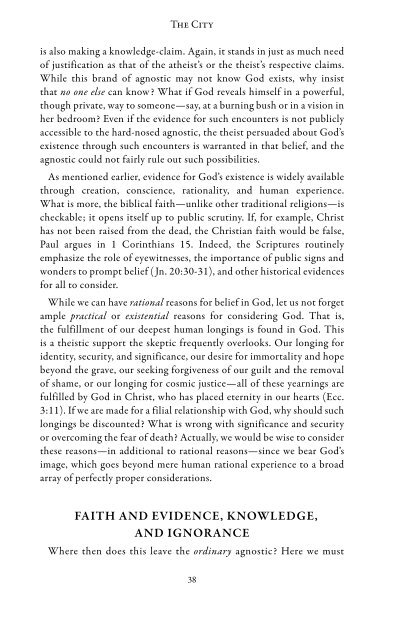THE CITY
h6c7p5d
h6c7p5d
Create successful ePaper yourself
Turn your PDF publications into a flip-book with our unique Google optimized e-Paper software.
The City<br />
is also making a knowledge-claim. Again, it stands in just as much need<br />
of justification as that of the atheist’s or the theist’s respective claims.<br />
While this brand of agnostic may not know God exists, why insist<br />
that no one else can know? What if God reveals himself in a powerful,<br />
though private, way to someone—say, at a burning bush or in a vision in<br />
her bedroom? Even if the evidence for such encounters is not publicly<br />
accessible to the hard-nosed agnostic, the theist persuaded about God’s<br />
existence through such encounters is warranted in that belief, and the<br />
agnostic could not fairly rule out such possibilities.<br />
As mentioned earlier, evidence for God’s existence is widely available<br />
through creation, conscience, rationality, and human experience.<br />
What is more, the biblical faith—unlike other traditional religions—is<br />
checkable; it opens itself up to public scrutiny. If, for example, Christ<br />
has not been raised from the dead, the Christian faith would be false,<br />
Paul argues in 1 Corinthians 15. Indeed, the Scriptures routinely<br />
emphasize the role of eyewitnesses, the importance of public signs and<br />
wonders to prompt belief ( Jn. 20:30-31), and other historical evidences<br />
for all to consider.<br />
While we can have rational reasons for belief in God, let us not forget<br />
ample practical or existential reasons for considering God. That is,<br />
the fulfillment of our deepest human longings is found in God. This<br />
is a theistic support the skeptic frequently overlooks. Our longing for<br />
identity, security, and significance, our desire for immortality and hope<br />
beyond the grave, our seeking forgiveness of our guilt and the removal<br />
of shame, or our longing for cosmic justice—all of these yearnings are<br />
fulfilled by God in Christ, who has placed eternity in our hearts (Ecc.<br />
3:11). If we are made for a filial relationship with God, why should such<br />
longings be discounted? What is wrong with significance and security<br />
or overcoming the fear of death? Actually, we would be wise to consider<br />
these reasons—in additional to rational reasons—since we bear God’s<br />
image, which goes beyond mere human rational experience to a broad<br />
array of perfectly proper considerations.<br />
FAITH AND EVIDENCE, KNOWLEDGE,<br />
AND IGNORANCE<br />
Where then does this leave the ordinary agnostic? Here we must<br />
38


